With the ewe sitting on her rump, her back resting against my son’s legs, I picked the manure from her toes and trimmed each cloven hoof. There are a good many things no one warned me about sheep. After 5 years, I’m finally starting to figure them out, and “Vax Day” at Runamuk Acres was serious business last week. Adopting a no-nonsense attitude which left no room for any sheepish shenanigans, I fulfilled my duty as farmer, administering a round of vaccinations and routine care to each of our 11 sheep. Sitting in this awkward position there wasn’t much the ewe could do but to relax and allow me to do my work.
Welcome to the latest edition of Updates From the Farm, a subset of Sparkling Audacity. If you are new here, read my About page to find out what this is, who I am and why I am doing this. At “Sparkling Audacity” you’ll find the recantings of one lady-farmer and tree-hugging activist from the Runamuk Acres Conservation Farm in Maine.
Hooked on Sheep
No one warned me about sheep when I accepted a pair of elderly Romney-crosses as a gift to the farm. I’d just purchased the property earlier in the summer and my hands were full establishing the farm’s infrastructure at our new home. With 60-some chickens and 30 beehives already, adding more livestock to my operation was the furthest thing from my mind.
They were friends of ours, however, through the local 4H chapter. Their girls were grown and moving on to college. The parents were selling off the flock their daughters had amassed, but these 2 were special. The family wanted them to have a nice retirement home, and chose Runamuk for their final chapter. With a 10-acre field out back just begging for grazing animals, I didn’t have it in me to say no.
No one warned me how personable sheep can be. Much like dogs, they’re friendly and loving. They’re really very sweet-natured animals. Naturally, by the time those old Romney’s passed on I was hooked on sheep─line and sinker. I invested in a starter flock of finnsheep with the intention of using them to remediate the field through rotational grazing, and we’ve grown slowly and steadily ever since.
Sheepish Shenanigans
A former landing strip, the forage on the field was sparse and lacking in diversity. The soil quality on the entire property is sandy and acidic, low in nutrients and organic matter. I was determined to put methods of regenerative agriculture into practice to improve conditions for the benefit of the ecosystem at large.
Starting with solar-powered electric net fences, I learned quickly that sheep are more wily than you might imagine. No one told me that, either…
It became apparent, though, that even the most docile sheep will test the fences if they think the grass is greener on the other side. The solar-powered fences were not strong enough to contain the flock, and that first summer of rotational grazing I had sheep escapes every other day. I was constantly running to coral my runaway flock.
The day I was awakened at 4am to the sound of baaa-ing coming from the road in front of the house, and the ensuing chase in my nightgown and galloshes was the final straw. That was the morning I came up with the idea of running a line of semi-permanent electric fencing up through the middle of the field to run power from the farmhouse for the net-fences. This put an end to their sheepish shenanigans. Mostly.
After that incident, it also occurred to me to use a bit of grain to lure the flock when break-outs inevitably happen, so I no longer chase sheep, either. …mostly.
Booming Population
In the 5 years I’ve been rotating the flock around the field, the impact they’ve made on the ecosystem is undeniable. What once was sparse vegetation has become a veritable jungle of plant growth. At the height of the growing season, some grasses come up to my chin (I am 5 ft 6). Moving the net-fences becomes a challenge in such thick undergrowth, but not impossible.
A crucial element in any ecosystem, the insect population has soared. On any golden afternoon in the summer, you can watch life teaming above the field. Countless tiny insects floating, flitting and zipping above the grasses. The booming population of invertebrates attracts a myriad of wildlife and our community grows. Supporting an abundant population of bluebirds, wild turkeys, and a bald eagle who occasionally deigns to soar over the field scouting for prey. We have a local family of foxes, plentiful rabbits, a resident deer herd and I even caught a glimpse of the elusive Canadian lynx a couple years back.
Surprisingly, I’ve had little trouble with predators to my livestock.
Wool Slippage
Though I had some experience with animal husbandry, I’ve definitely leveled up since becoming a shepherdess. Learning to identify the signs of vitality and weakness─or illness─in an animal is crucial to keeping livestock. Keying in to an animal’s behavior to know when they are stressed is something that can only come with experience. Coming off the field in November everyone looked great. The flock was in prime condition, healthy and really just beautiful animals. A month later I noticed the wool slippage on my girls and became concerned.
As a bootstrap farmer, I can’t afford to call a vet every time I need to work with my animals. I’ve had to learn how to treat sick animals and how to keep them healthy to prevent sickness. This means I create my own feeding regimen, administer my own vaccinations, and if someone gets sick, I’m the doctor on-call.
Not that I wouldn’t pony up the dough to get the local traveling vet to the farm if I got in over my head and I have, but I’ve learned enough at this point that it would have to be something catastrophic for me to make that call.
I remembered seeing this same issue last year, but to a lesser degree. I’d believed it to be a nutrition issue and had adjusted their diets accordingly. But here it was again and their physiques look great, so what could be the cause of the slippage?
Finnsheep have next-to-skin quality wool. It’s luxuriously soft and wonderful to have against your skin─not like those itchy and scratchy wools you typically think of when you think of wool. Having these beautiful animals in prime condition with these ratty wool fleeces is kind of a bummer aesthetically speaking. I had to wonder, what does it say about their health?
A bit of research and post to a sheep farmers’ facebook group returned a couple of possibilities. One was the nutrition issue. The other─was lice.
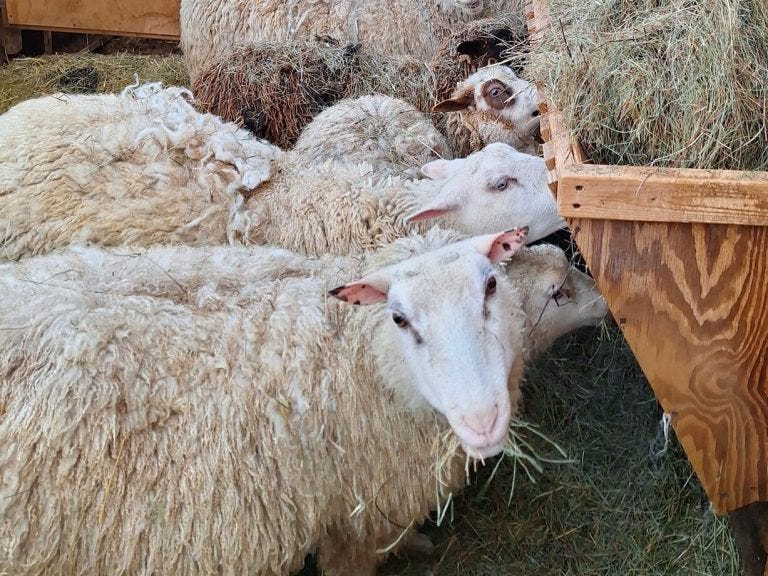
Sheep Lice
In all of the conversations I’ve ever had about farming, or about raising sheep─or animal husbandry of any sort─no one ever warned me that sheep could get lice!
I think I was in denial at first.
It’s hugely embarrassing. Does it make me a bad farmer if my sheep get lice?
The farmers on the facebook group said you would be able to see the lice with the naked eye. Well, I looked and looked but for the life of me, I couldn’t find any lice!
I went back to the internet and googled photos of lice. Went back to the sheep-shed to part the wool on their backsides looking for lice. I was so skeezed out─it still gives me the heebee-geebees to think of it even now!
So I ramped up their nutrition regimen again, at this stage in their pregnancy it can only do them good anyway. A couple more weeks passed and finally I found it. The squiggly little worm writhing against the ewe’s skin as I parted the wool and exposed it to the light of day. And there were the eggs…so many eggs! (Insert gagging noise here.)
Thoroughly repulsed, I was scratching my own scalp for days, checking to make sure I hadn’t inadvertently caught lice myself! But no, lol. I’m fine. Lice are species-specific parasites. You can’t get lice from a sheep unless you’re a sheep. I’m just really, really─really skeezed out.
It’s like when you find a tick on yourself after being in the woods and for the next 3 hours every tickle feels like another tick.
Vax Day
Now that I’ve treated for it, I feel okay about sharing that Vaccination Day, or “Vax Day”, at Runamuk was mostly about treating the sheep for lice. I never knew it was a thing. When I signed up for this job no one warned me that sheep can get lice! But now I know.
And now you know too, lol. You’re welcome.
With the help of my son, BraeTek, I was able to wrangle each of our 11 sheep to give them a round of treatments. I gave them each a CDT vaccination via injection, an oral de-wormer that would eliminate internal parasites as well as the lice, and just to be sure, I did a topical application as well─I wasn’t taking any chances! While I had them, I trimmed their hooves and crutched the expectant mothers.
NOTE: Crutching is the technical term for trimming the wool away from the ewe’s udder to make it easier for newborn lambs to find her teats.
It’s a good feeling to know that I am capable of so much. Corporations in industry want us to believe that we are incapable of doing these things so that we will turn to them and give them our hard-earned money. It’s a tactic employed by almost every industry I can think of: the food industry, the medical industry, education… They’ve numbed us so effectively with electronics, indoctrinated the masses through public schooling, that they’ve created a society that is largely incapable.
Incapable of what? You name it…incapable of baking their own bread, changing their own tires, training their own dogs, fixing their own stuff, parenting their own kids…it goes on and on. When you’re incapable, you have no choice but to turn to someone else to fill the gap, and that’s exactly how corporations want us.
Well, I for one refuse to play their game. If I can do it for myself, I sure as hell will!
No One Warned Me About Sheep
After the intensity of Vax-Day, the rest of the week was a breeze. There was another snowstorm to clean up after, some lesson planning on my part and schoolwork on BraeTek’s part. We hosted a number of guests to the farmstay, and I made some progress in the Propagation Room.
Over the weekend, I published a piece entitled “Braving Dragon-Country for a Trek into the Maine Wilderness“. Click on over and check it out!
I even left the farm Saturday for a movie night at my sister’s. I’m making it a point to do those things now, because in just a few short weeks I’ll sequester myself to the farm, scarcely leaving for the duration of lambing season.
No…no one warned me about sheep. No one warned me that they are more clever than you’d think. That they can become acrobats when cornered and they’re surprisingly fast runners. No one told me they can get lice─though I remember hearing that sheep certainly know how to die.
No one told me about sheep-kisses, either. Or the fact that sheep love to be scratched through all that wool─they love it so much they’ll lean right into you. They failed to mention sheep’s quirky personalities and humorous antics. But then, nothing and no one could have prepared me for the overwhelming rush of love and gratitude that comes with every new lamb born to this farm.
That I should be here to receive each one─farmer and steward in this beautiful, special place─is a precious gift and I do not take that for granted. It was a hard scrabble to get here and it’s a hard scrabble to keep it. However, when the reward is seeing these tiny newborn lambs coming into the world, helping them to connect with their mom and ensuring their survival… The pay-off isn’t in the paycheck, but in knowing later this summer we’ll all be on the field in one of those golden afternoons, the jungle of pasture grasses teaming with life. It’s knowing that every one of us plays a part in creating the thriving habitat at this obscure ecological reserve in Western Maine. And it’s the supreme sense of connectedness to nature that─for this humble farmer─it yet unrivaled in my life. THAT existence is worth every hardship─to me. Even lice.
Your Friendly Neighborhood Farmer,
Sam
Thank you for following along with the story of this lady-farmer! It is truly a privilege to live this life serving my family and community, and protecting wildlife through agricultural conservation. If you enjoy reading my written works, please consider supporting my work. Check back soon for more updates from the farm, and be sure to follow @RunamukAcres on Instagram or Facebook!




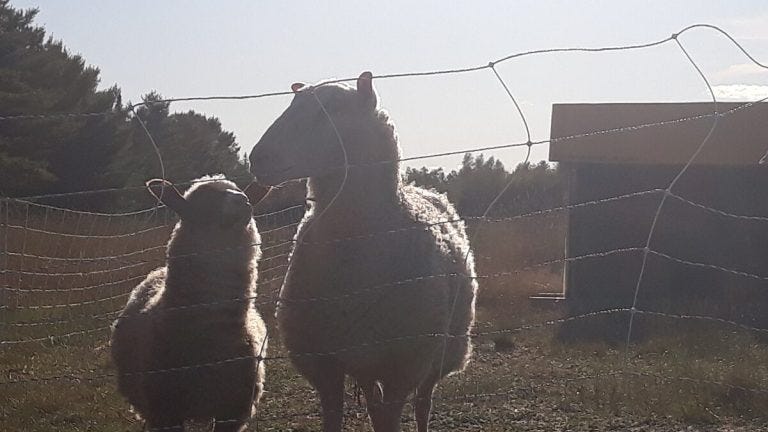
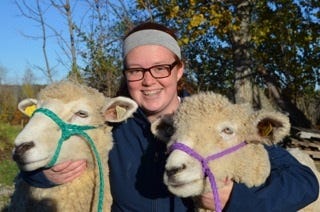
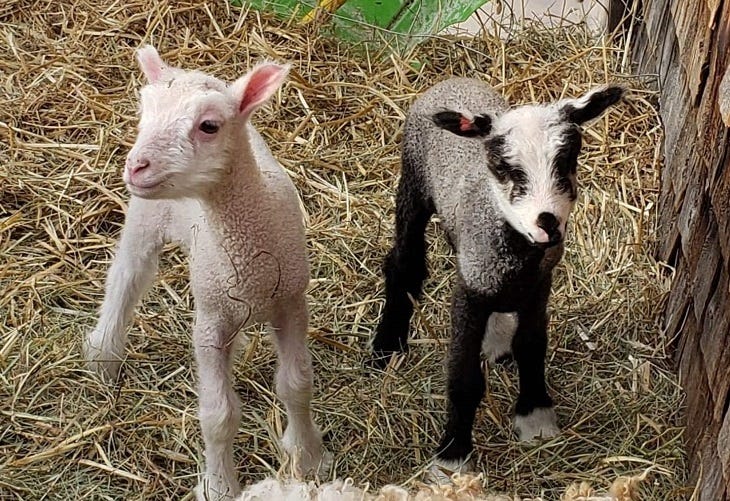
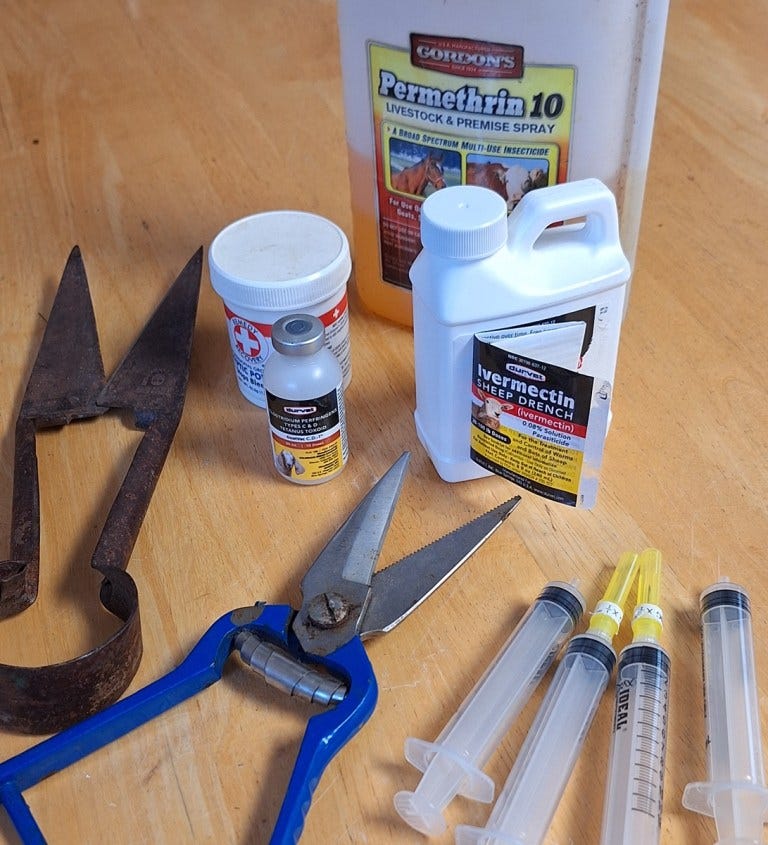
Enlightening. The fusion of practical advice, personal reflections, and a touch of humour makes this a relatable read, offering insights into the unique challenges and rewards of farm life.
This is fascinating. I can't believe you do all this on your own. How on earth do your find time to write? And eat? 😄